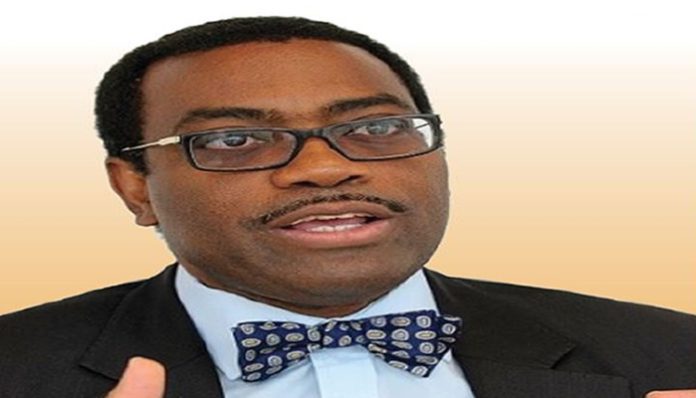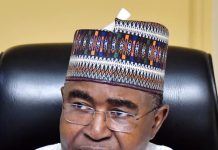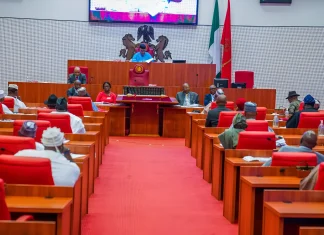

President of the African Development, Akinwumi Adesina, tells OYETUNJI ABIOYE about his career, economy, family and other issues
Do you think the Nigerian economy can cope or survive with the current exchange rate of over N1,500/dollar?
No, it cannot. The slide of the naira is because people are losing confidence in the economy. That is why I was saying that the way to deal with that is to see if we can expand the inflows of foreign exchange into the country. And hopefully, I just saw what the Governor of the Central Bank is doing in terms of the Monetary Policy Committee, as regards raising interest rate. I guess that will work, probably for the portfolio investors, but again, there are other consequences it could have in terms of investment in the critical sectors that you need to grow to be able to produce more and have the kind of export oriented-industrial manufacturing stance.
It is a balance between short-term solutions and long-term structural things that need to be done. I believe we need to deal with the short-term but keep the eye on the long-term structural things that must be done, and I will continue to maintain that. If you have an import-dependent economy, and you have a lot of forex like we used to have in abundance, and we were using that foreign exchange to shore up the naira, we are killing ourselves.
First, that way, you are making import much cheaper because of the overvalued exchange rate.
Second, you also have a situation that is killing the domestic economy, because the productions of other industries are negatively affected by that.
Third, the non-oil economy that you need to be much more performing requires revalued exchange rate, because they are not traded in dollars, but in domestic currency equivalent. That means if your currency was much more devalued but not collapsing, you would have had a lot more opportunity to be competitive in the export of other items. It is like a flood is coming and you are trying to use your hand to stop it. Eventually, the flood will carry you and your hand away. I think we need to take a very serious look at that.
Take the case of places like Netherlands for example. About a year or two ago, they were earning over $90bn a year from agricultural exports alone. Yet, how much land do they have? South Korea was earning about $230bn from exporting machinery and other electronics. We have top brains in this country. So, being competitive in the digital industry is important. Of course, we are doing well in the creative industry and others. We need to build those platforms that allow us to have that export-oriented manufacturing stance. I remember when I came to Nigeria a year or two ago, I gave a lecture to the Nigeria Manufacturers Association, and I remember they said that they liked the solutions I gave them and will like to turn it into a national policy.
If minimum wage is increased like it is being agitated, don’t you think that will lead to a crisis, because the private sector will not be able to match up?
As the President of the AfDB, I try not to get involved in domestic government policies, because those are domestic things government has to worry about.
But, I can only say in the general sense that simply increasing nominal wages in a high inflation environment is self-defeating, because at the end of the day, what matters is the effective purchasing power. So, keeping inflation down is the main thing. There are monetary policy issues that have to be taken. There are also a lot of other fiscal areas in term of expanding access to forex and changing the mix of national instruments available to government in terms of expensive commercial loans, which will also add to the problem. At the end of the day, nominal wage increase in a high inflation environment is going to run away from you. Keep your eye on just making sure that inflation goes down; and for that inflation to go down, a big part of what consumers are spending on should be produced locally.
How can the issue of unstable power supply be dealt with to help manufacturers?
There is no reason Nigeria should have epileptic power supply, simply because that is the cost of doing business. If you are not able to produce enough power domestically, and you are not able to be competitive in the local or regional markets, that is a problem. I think that Nigeria has a lot of potential for hydro and solar power across the country. In some areas, such as the Mambilla Plateau, there is even potential for wind power. As a country, we ought to be talking about having about 60,000 or 70,000 megawatts capacity, not 4,800MW that we currently generate. If Nigeria is to develop fast and grow in double digits, it must solve its power problem. But, more than solve it, it must accelerate it in a quantum way to allow Nigerians have low-cost power. I cannot emphasise it enough that if we don’t have electricity, the economy cannot grow. Running on diesel is not the way to run an economy. A lot more priority needs to be put on power; and it’s not rocket science.
At the African Development Bank, we are supporting 11 countries in the Sahel zone of Africa, and that includes the northern part of Nigeria, to develop 10,000 megawatts of solar power. It is called ‘desert to power’, and it is a $20bn investment that would provide electricity for about 250 million people. Basically, what I am saying is that there has to be a combination of thermal power, hydro power, solar power and every other resource we have, because the nation cannot develop in darkness.
The International Monetary Fund has said that Nigeria has brought back fuel subsidy through the back door, and the World Bank has equally mentioned the same thing. Considering the pain this policy has caused Nigerians, don’t you think it should be stopped and a different policy direction taken?
I am not going to comment on the efficacy or otherwise of any domestic policy of any country, but the only thing I can say is that you cannot have surgery without anesthesia, or the distraction of anesthesia. At the end of the day, the impact of policies is on the livelihood or the living standards of the people, and I am sure that every government would want to look at the desired and undesired impacts of any policy, and try to have an adaptive way to adjust based on the realities that you actually face. At the end of the day, regardless of the country, if you are a pilot and you are going right through a headwind, you can either continue to do that or you go in a different direction. Public policies are always very important in the face of realities that we face, and I am sure the government must be thinking about that.
You have won several awards over the years. How would you rate the Obafemi Awolowo Prize for Leadership Award you just received, and what does it mean to you?
I have got quite a lot of global awards, but this is the first award I am getting that makes me emotional. It makes me emotional, because it is about somebody I revered because of his ‘welfarist’ policies. Without those policies, I might not have gone to school. For me, it is very special thing, and that places it not in my head, but in my heart.
Also, I don’t believe that awards are things you hang on as trophies. Rather, awards are supposed to make you have a sense of great accountability to do more. For me, the Obafemi Awolowo Prize further reinforces what I already believe in. I am 100 per cent into welfarist and people-centric policies, because I think development should be about people, and that leaders should lead with their hearts, not with their heads. You need your head to think, but you must lead with your heart. That is the work I believe Awolowo did, and is the philosophy I believe in too. I have patterned myself after those welfarist policies and in terms of what I really do.
When people look at our economy, it is often said that there is no depth in what we do. Do you think we need a critical mass to achieve the kind of change we want to see?
I think developing a critical mass depends on what you want to change; so first and foremost, we need to have some things that should not be acceptable. We should not be accepting that Nigeria is a poor country or has no electricity. We should not accept that Nigeria cannot feed itself and that is why, for me, it is not just the way you want things to be organised but what you organised for. It is what you want to change. Leaders may have intrinsic capabilities to lead, but the people don’t eat your intrinsic capabilities. They want to see changes in their lives.
We should focus on what is acceptable or not, and what has become normalised. The abnormal has been normalised in many cases, and we have come to accept certain things. We should be a global player in the world, in terms of manufacturing, agriculture, education, trade and competitiveness. If you talk about leadership, it is leadership for what and to make Nigerians what? There is a difference in managing people in poverty, not where we are but where we should be. That is what we develop leadership for. I don’t need to know the difficult situation before giving a solution. I just need to write what I hate and develop a solution; that’s all.
What does inspiring inclusion mean to the AFDB?
I am a very gender-sensitive person, and I consider myself a defender of women’s rights, which I have been doing since very early in my career. I believe that no bird can fly with one wing. Every bird flies with two wings. You cannot develop any economy, unless you give the same rights to the women as you give to the men. Your gender should not have anything to do with how smart or capable you are.
Categorisation is not something I take lightly. I believe in girl child education because we have a problem in terms of high birth rate and fertility rate, and that happens a lot because the girls are not in school. I also think that women are the best in bringing up kids. They set values, but they must also have economic freedom, and enough resources to achieve that.
I also believe that financial investments in women are the best investments you can make, because if you invest in a woman who goes to school, has a business, and money, they will invest in their kids and solve malnutrition and stunted growth issues. They would make sure they have a decent household.
So when I took a look at it at the African Development Bank, I launched the Alphabetic Finance Action for Women in Africa. The goal is to mobilise $5bn for women’s businesses alone in Africa, because women can run businesses, but they don’t have access to land, collateral, and finance, simply because financial institutions mostly give those to men. So, I decided that we would change that and last year, we approved $1.5bn just for banks and financial institutions to help businesses owned by women.
When you talk about inclusiveness, I can include you and put you at the bottom; but I think that women deserve inclusiveness at the top, not only in finance, but also in the boardrooms.
What is AFDB’s policy when it comes to the inclusion of women?
It is making a difference every single day in the lives of young people in our urban and rural communities. Making a difference in the economy and making sure that Africa can develop with pride. That is what we do every single day. At the AFDB, I made a decision that we would not just be known for the banking part but also for our development strides. You have to accelerate that development and we are a very noble financial institution. Just last year, we were rated the best multi-lateral financial institution in the world. We were also ranked as the most transparent financial institution in the world. Today, we are a global financial institution working in Africa, and I say that because I am someone who believes that I have great staff, fantastic shareholders, and world members. Every single day, our motto is working constantly selflessly and in patience to accelerate Africa’s wealth.
We are currently facing a foreign exchange crisis as a country. How do we navigate it?
It is not easy to talk about some of the challenges that Nigeria is facing. And they are not unique to Nigeria, especially in terms of rising global interest rates, and the fact that you also have a situation of rising debt levels and rising debt service levels that have been going up because of the rising interest rates, as well as the depreciation of many currencies, including the naira. That means that the net debt exposure that you have serviced and the cost of actually doing that has gone up significantly at a time in which concessional financing globally has been going down. Therefore, the only way in which countries like Nigeria and others can get more access to capital is to go to the euro bond market and global capital markets, which again becomes more expensive because the yield curves are very different. Right now, the pricing becomes more expensive. I will say there are about four things that you should pay attention to.
One, of course, is to expand the access or the availability of forex. When currencies weaken, what you have is that you don’t have enough forex to actually back your currency; therefore your currency depreciates.
When you take a look at it, the approach that Nigeria has always been following for decades is that of allocating forex. So, it is an allocative position in times of a very restricted supply of foreign exchange. And that’s because we run an import substitution strategy that we have constantly been doing for a very long time. Nobody wins by playing defense. And the way to score is for Nigeria to have in my view, an export-oriented industrial manufacturing stance. That export oriented industrial manufacturing stance is like a funnel, in which you bring in more forex, because you’re actually developing your value chains that are export oriented and earning a lot of forex, as opposed to a redistributive model of a small amount of forex. That’s a fundamental structural change that any economy must have. And, that means the country has to build industrial value chains in which it has huge competitive advantage. It can be in agriculture, oil, gas or even creative industries. Basically any kind of industry that allows you to have the platforms to be a manufacturing powerhouse. That is a long-term solution to the problem that you have today.
Second, there needs to be a lot of support around Nigeria, given the tight fiscal space, and the lack of forex, to make available a lot more concessional financing to the Nigerian economy. And that’s what we’re doing at AFDB. This year, we expect to approve with our board, because we always go to our board of directors for approval, but our plan is to be able to do $1.76bn of financing to Nigeria in different sectors, including considering a potential policy base operation of budget support to Nigeria. We are discussing with the Minister of Finance; that is part of a $1bn budget support operation that will go into two tranches. Again, I will say it has to be approved by the board, but these are all the things that we are hoping to be able to do.
The other challenge is the high inflation. Inflation is almost 30 per cent and as a result of that, you will find that the purchasing power has been eroded significantly in Nigeria. But tackling that inflation also requires looking at some of the structural drivers. A big part of that inflation is food price inflation. If you look at the Consumer Price Index, probably 65 per cent of it, If not even 75 per cent, is actually the price of food. And so, you don’t necessarily deal with food price inflation through your standard macroeconomic policy of tightening monetary supply. You deal with it by producing food, because that’s what needs to be done. I think it’s very important to be able to deal with that.
For the third part of it, a lot of it is actually cost push factors that are driving many of these things. If you look at structural challenges in terms of poor infrastructure, lack of electricity, and of course insecurity in many of the places that makes it difficult for people to produce food, aggregate food and transport food. I don’t think there is a unitary solution to the problem. I think it needs to be a structural solution.
Nigeria is currently facing a food crisis. As a former minister of agriculture, what can be done to address this crisis?
I am not used to complaining ; I am used to finding solutions. I told the President that we will strongly support the Nigerian government in finding a solution to that challenge. As I speak to you, we have approved $134m for Nigeria to implement an emergency food production plan. Already, we have supported the cultivation of 118,000 hectares of wheat in Nigeria this season. This month (March), we will have 150, 000 hectares of maize production.
By the rainy season in May and June, we will support Nigeria to do 300,000 hectares of rice. We will also do 300,000 hectares of maize, 150,000 hectares of cassava and 50,000 hectares of soybean. By the end of March, Nigeria would get out an additional one million metric tons of wheat and by November, we’ll have an additional four million metric tons of rice, cassava, maize and soybeans.
I am saying that because we have to continue to push for more food supply. But one thing that I would say is that the government needs to go back to the policy of electronic wallet system. When I was minister, we designed a programme to get seeds and fertilisers to farmers directly via their mobile phones by electronic vouchers. We were able to reach 15 million farmers in four years, and the whole place was brimming with food. It is like a patient who is sick, that you recommend something from the pharmacy, but if the pharmacy does not have the medicine, the person will always probably die. At the end of the day, it is not about the prescription, but the access to what they need. That is what I advise needs to be done very quickly. Access to high performing yields, high performing seeds, fertilisers and farm inputs is very critical; otherwise you will not be able to do it.
Those are the things we are doing in Nigeria. In addition to that, we have a programme that we have already implemented, called ‘special agro industrial processing zones’. Those are new economic zones we are supporting Nigeria to develop that are dedicated completely to food and agriculture, so that they have infrastructure food processing facilities. We provided $520m for that, in conjunction with the Islamic Development Bank, and the International Fund for Agricultural Development. We expect that those things will start hitting the ground, and we will start construction by June. They will change the entire rural economy from the economic misery of right now to new zones of economic prosperity, because you turn agriculture into real business with value chains that can add value by creating massive amount of jobs.
In addition to that, we are already planning to launch in 28 states a programme for $1bn. Together with our partners, we will build 28 more special agro industrial processes. The point I want to make is that structural interventions will make agriculture more productive, efficient and competitive. It will also earn a lot of forex.
How did you meet your wife?
That is the most interesting thing. I met my wife in the university. I would not be who I am and where I am today without my wife. She is even smarter than me. When we met at the University of Ife (now Obafemi Awolowo University), she was studying for a Master’s degree while and I was doing my work at the graduate school. One day, I went to a restaurant with a friend, and as we were eating, I just saw this lady walk in. That was in 1981. She was wearing a blue dress with white paint on it, and she also had a blue head-tie on. She was holding a book and walked up to our table, and I got distracted from my conversation and started focusing more on her. When we finished eating, I asked my friend who she was and I got her name and room number. I am very relentless with what I like to have, so I went after her.
I needed to make an impression for her to notice me, so I bought a very nice chicken from a supermarket and fried it well with spices, as my mum had taught me how to cook. I packaged it well and went to her room, and put it there with a card , introducing myself.
That was how she had to follow me, because she could not forget that gesture. She had to find out who the guy was, and that was was how we met. However, she likes to remind me that I have not been cooking since that time.
You are widely travelled but stay true to the African culture in your dress sense. How have you managed to achieve this?
I was not born a Nigerian by mistake, and I don’t think the fact that Nigeria has challenges is the way my country should be looked at. I see challenges and opportunities to do things differently, or an inspiration to rethink about issues. If I had wanted, I would have got the nationality of the United States of America, because I lived and worked there. But, I remember saying to one of my colleagues that I would not exchange the Nigerian passport for anything. My kids are American, because they were born there, and I always say that it is a reminder of what needs to change about where I am from. Therefore, in anything I do, there is a sense of duty and responsibility of nationalism of where I come from. I did not become a Nigerian by mistake; so serving Nigeria and supporting the country in any capacity I find myself in is not a job but a mission. I cannot think of any greater responsibility to be given than a position with the platform and resources to change the destiny of the continent of my birth. That is the greatest responsibility, and that’s how I view it. And, I would do the same for Nigeria.
What is your favourite local dish?
My favourite local dish is eba and gbegiri. My wife really helps with that and I am proudly Nigerian. I will live as a Nigerian, die as one and on the resurrection day, if God allows it, I will resurrect with a Nigerian flag.
What informs your unique haircut?
Most times, I don’t realise some of these things but I think that at the end of the day, the way you present yourself is very important; and I think identity is very important. People look at you based on how you relate with them, more than what you look like. So, I am more interested in my relationship with people than what people think I look like or dress like. Fundamentally, when I was growing up, my mother taught me saying, people are your clothing; never forget that. So how you talk to people, treat, support, and work for them is more important than what you look like.
Join Television Nigerian Whatsapp Now
Join Television Nigerian Facebook Now
Join Television Nigerian Twitter Now
Join Television Nigerian YouTUbe Now





